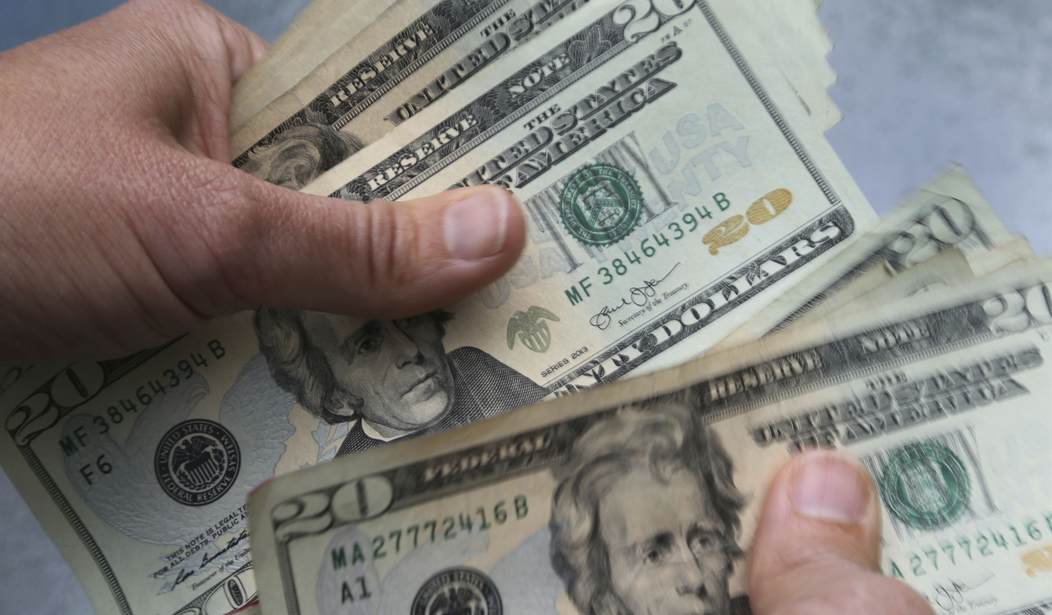The global debt level is reaching shocking new heights. The Institute of International Finance recently estimated the current total world debt is roughly $247 trillion—a truly unprecedented figure.
But as frightening as the global debt has become because of the dangers it poses to the world’s economic stability, Americans should be far more terrified of what this problem might mean for them, especially if the globe endures another major financial collapse before the United States can get its fiscal house back in order. Put simply, America is on the verge of experiencing an absolutely catastrophic period of economic change, and it’s due mostly to its skyrocketing debt, which is the result of decades of reckless government spending—by both political parties.
Although understanding how international financial markets work can be tricky, there are two basic reasons Americans should be deeply concerned. The first is that U.S. debt payments will likely over the next decade consume an increasingly larger share of the federal budget. In fiscal year 2018, which ends September 30, 2018, America will pay about $310 billion to service its national debt. The Balance reports these payments are the fourth largest budget expenditure in the current federal budget. Excluding Social Security payments, only “military spending ($874.4 billion), Medicare ($582 billion), and Medicaid ($400 billion)” are more costly.
Over the past decade, the size of these payments has not increased substantially, in large part because interest rates remained at historic lows as the world tried to pull itself out of the 2008 financial crisis. However, now the U.S. economy and many other leading economies are improving dramatically, interest rates will inevitably have to rise to ensure inflation doesn’t get out of control. AEI’s James Capretta estimates, “If the average real interest rate … gradually rose to around 2.2 percent over the next decade, then federal interest payments could reach $1.2 trillion in 2027 — or more than $0.3 trillion above CBO’s current forecast.”
Recommended
This massive figure would consume so much of the federal budget that the government would be forced to raise taxes just to continue paying for existing government spending, stifling economic growth. This would be particularly problematic should the United States enter another deep recession, because during recessions, tax revenues often fall because of lower economic production.
Even more troubling, however, is the effect these debt problems could have on our currency. On its current trajectory, the United States will by 2027 likely be paying $500 billion to $1.2 trillion every year to cover federal debt interest payments. If the economy were to crash, the only way for America to continue making those payments without raising taxes or cutting spending, both of which would be very difficult to do in a deep recession, would be to seek additional loans from foreign governments or to print money. The former would only work, if at all, temporarily, and would eventually exacerbate the problem as interest payments grow ever higher. The latter is the most likely scenario, but printing money would create inflation, devaluing existing cash. The reason this would be so dangerous if the United States already has massive amounts of debt is that it could significantly undermine the world’s faith in the U.S. dollar, which is used every single day for international business transactions.
There is no global currency, so when two countries or, more commonly, two parties from different countries buy and sell, they often do so using dollars. There are some exceptions, of course. In the European Union, for instance, people buy and sell using euros, but for most of the world’s business transactions, dollars remain the currency of choice. The same is true for many of nations’ centralized banks. The reason this has occurred is that, following World War II, America has been the world’s most reliable and stable economy, making the dollar in the minds of many the safest currency among the more than 180 currencies available in the global marketplace.
That perception has slowly been changing, however. Over the past decade, top officials in countries like China have openly questioned the stability of the dollar and even wondered why some other country’s currency couldn’t replace it as the global standard. Some folks at the United Nations would love nothing more than to replace the U.S. dollar with a U.N.-sanctioned global currency, and some Europeans would surely push the euro as a better alternative.
If the dollar were to be replaced as the world’s currency of choice, it would cause economic turmoil in the United States. Not only would our markets and stock exchanges collapse as investors’ pessimism about America soars, hundreds of billions of dollars in cash would likely come rushing back to the United States, where foreign investors would buy up whatever stable assets they could, most likely real estate. More dollars in our markets would cause additional inflation, making our money even less valuable. This would likely force the Federal Reserve to raise interest rates to keep inflation in check, thereby making it even harder for businesses to get loans (because they would be more expensive with higher interest rates), causing the economy to continue spiraling downward.
Eventually, the United States’ economy would recover, although it might never regain its status as the world’s most important economy. But in the meantime, Americans would likely endure a Great Depression-sized recession.
All of these problems are avoidable. If America were to steadily reduce its debt, the world would likely stick with the U.S. dollar for the foreseeable future; if it ain’t broke, don’t “fix” it, as they say. The only way for this to occur, however, is for politicians in Washington, DC to get their act together and move away from our currently unsustainable policies. That doesn’t appear to be happening on either side of the aisle, and the results could eventually be far-reaching and monumental.
Justin Haskins (Jhaskins@heartland.org) is executive editor and a research fellow at The Heartland Institute.

























Join the conversation as a VIP Member